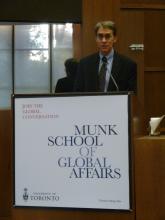Secondary menu
An Evening with the Head of Human Rights Watch, Ken Roth

Sarah Beamish, 2L J.D/MGA student
On October 17, the University of Toronto Faculty of Law’s International Human Rights Program sponsored a wide-ranging discussion between Ken Roth and Michael Ignatieff on “Today’s Human Rights Challenges.” Roth is the Executive Director of Human Rights Watch (HRW), an international organization that conducts human rights research and advocacy, while Ignatieff is currently a Professor at the Munk School for Global Affairs.
Roth spoke at length about the challenges facing the human rights movement with respect to the uprisings in the Middle East and North Africa. “Toppling a dictator is the easy part,” he said. “The tough part is how you build a rights-respecting democracy after that…Those of us in the human rights movement are used to being anti-state. We stand up against the state. But we also need the state, and if you don’t have a strong state, you have chaos, which is as much the enemy of rights as an authoritarian or dictatorial environment.”
The human rights movement faces the difficult task of supporting the right of people in the region to elect their governments, while recognizing that majoritarianism is not the same thing as a guarantee of rights. This is particularly true for women, LGBT people, and religious minorities, all of whom are at risk of repression by the groups that dominate constitutional drafting processes and the political system. According to Roth, “This is where rights are counter-majoritarian. They are a limit on what the majority wants.” The challenge is to remind the newly powerful that the rights they demanded for themselves as minorities must also be respected and guaranteed to others.
A related challenge is addressing the frequent allegation that advocating for women’s rights is an ethnocentric intervention that violates cultural beliefs in the region. Roth believes that the wish of some men to subordinate women is not the end of the story, and that the human rights movement must expose the ways that this narrative denies the right of women to have their lives and preferences act as an equally defining aspect of their cultures. He has hope, and noted that in Egypt, for instance, many key figures are wary of religious extremism in politics and are working constructively with civil society, knowing that Egypt cannot afford the economic consequences of being seen as a radical state.
Roth discussed the ongoing slaughter of civilians in Syria as a particularly difficult area of human rights work. He said that the complexity of the situation makes it tricky to give recommendations to governments. Sanctions have been unsuccessful, and Russia and China have blocked UN Security Council efforts to use the International Criminal Court. While the death toll has reached the threshold for an intervention under the Responsibility to Protect doctrine, Roth noted that this threshold is just one criterion of several, and the key issue is whether an armed intervention might do more harm than good by increasing sectarian violence. Many are also wary of using of the doctrine, believing that NATO used it to bring about regime change in Libya.
Related to Roth’s discussion of the changes in the region was his analysis of the impact of social media and new technologies. “Mass atrocities require silence,” he said. “Every one of us is potentially a publisher or a broadcaster.” New technologies make it more difficult for states to hide abuses, and make it easier to generate public discontent. Further, while in the past governments could easily target civil society leaders, new technologies facilitate diffusion of leadership that is difficult for governments to counteract or control. With the opportunities offered by new technologies have also come new human rights challenges related to privacy and freedom of expression.
Other changes have pushed HRW to evolve. In response to the rising power of the BRICS countries (Brazil, Russia, India, China, and South Africa), HRW is opening new offices and is developing strategies that reflect the shifting world order. Action on Zimbabwe or Sri Lanka now means influencing the foreign policy of South Africa, and China or India, respectively. Roth identified the major challenge of working with these governments as their history of responding to human rights as western impositions on the sovereignty of developing states, and described the need to expose this to public scrutiny by people within these countries.
Roth noted two other trends that concern him. The first is the backlash against international justice that is taking place even as the system is enjoying major successes like the convictions of Thomas Lubanga and Charles Taylor. The second is the disrespect for human rights seen by key western governments like the United States and Canada. Roth lamented the decline in human rights leadership under the Harper government, noting its prolonged failure to repatriate child soldier Omar Khadr, and its ideologically-driven funding cuts to civil society groups.
Finally, Roth shared the story of how human rights became his career. A graduate of Yale Law School and a former federal prosecutor, Roth left legal practice to join HRW in 1987. Roth was influenced by the spirit of the 1960s and by his father’s stories of growing up in Nazi Germany, which made him “very aware of the evils that governments could commit.” This was not an obviously good career move at the time: his friends from law school were becoming partners at their firms, and HRW was an obscure organization with only 20 staff. Since then, HRW has become a global organization of 350 staff working in 45 countries with an annual budget of US$65 million. Roth calls sticking with this path the best decision of his deeply fulfilling career. Still a lawyer at heart, Roth now goes head-to-head with the worst human rights violators in the world, and is now, as Ignatieff noted, “a historical figure.”
You can watch a video of the event here.
